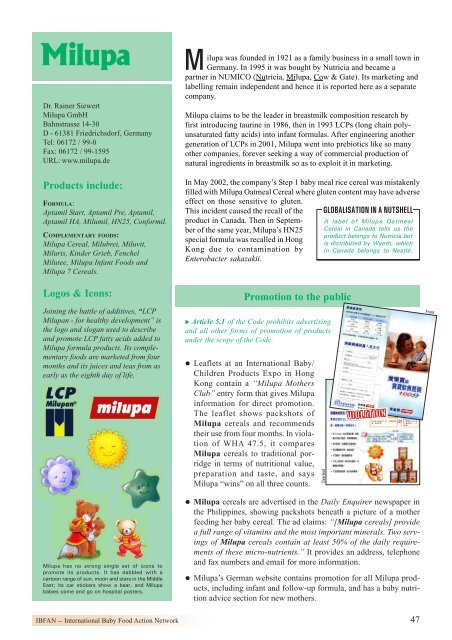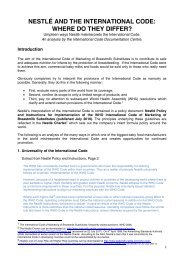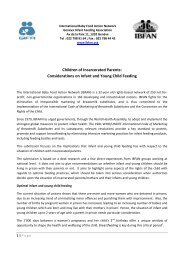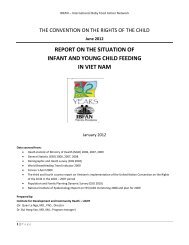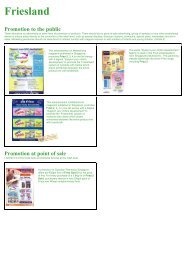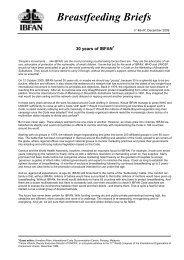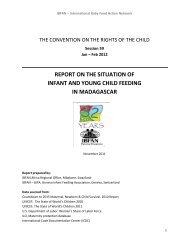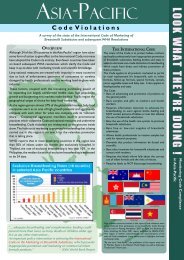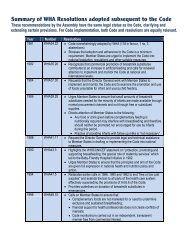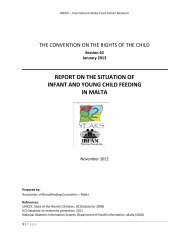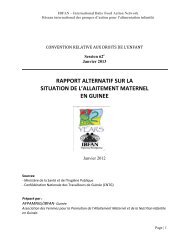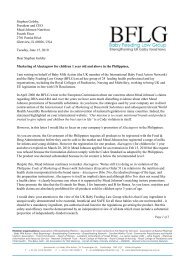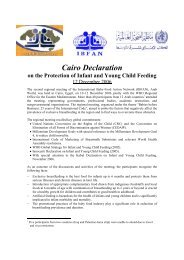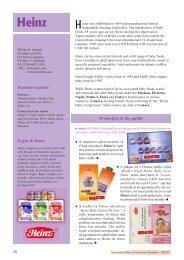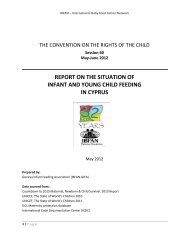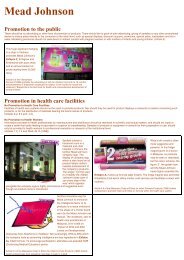Create successful ePaper yourself
Turn your PDF publications into a flip-book with our unique Google optimized e-Paper software.
<strong>Milupa</strong> M ilupa was founded in 1921 as a family business in a small town in<br />
Germany. In 1995 it was bought by Nutricia and became a<br />
partner in NUMICO (Nutricia, <strong>Milupa</strong>, Cow & Gate). Its marketing and<br />
labelling remain independent and hence it is reported here as a separate<br />
company.<br />
Dr. Rainer Siewert<br />
<strong>Milupa</strong> GmbH<br />
Bahnstrasse 14-30<br />
D - 61381 Friedrichsdorf, Germany<br />
Tel: 06172 / 99-0<br />
Fax: 06172 / 99-1595<br />
URL: www.milupa.de<br />
Products include:<br />
FORMULA:<br />
Aptamil Start, Aptamil Pre, Aptamil,<br />
Aptamil HA, Milumil, HN25, Conformil.<br />
COMPLEMENTARY FOODS:<br />
<strong>Milupa</strong> Cereal, Milubrei, Miluvit,<br />
Miluris, Kinder Grieb, Fenchel<br />
Milutee, <strong>Milupa</strong> Infant Foods and<br />
<strong>Milupa</strong> 7 Cereals.<br />
Logos & Icons:<br />
Joining the battle of additives, “LCP<br />
<strong>Milupa</strong>n - for healthy development” is<br />
the logo and slogan used to describe<br />
and promote LCP fatty acids added to<br />
<strong>Milupa</strong> formula products. Its complementary<br />
foods are marketed from four<br />
months and its juices and teas from as<br />
early as the eighth day of life.<br />
<strong>Milupa</strong> has no strong single set of icons to<br />
promote its products. It has dabbled with a<br />
cartoon range of sun, moon and stars in the Middle<br />
East; its car stickers show a bear, and <strong>Milupa</strong><br />
babies come and go on hospital posters.<br />
<strong>IBFAN</strong> -- International Baby Food Action Network<br />
<strong>Milupa</strong> claims to be the leader in breastmilk composition research by<br />
first introducing taurine in 1986, then in 1993 LCPs (long chain polyunsaturated<br />
fatty acids) into infant formulas. After engineering another<br />
generation of LCPs in 2001, <strong>Milupa</strong> went into prebiotics like so many<br />
other companies, forever seeking a way of commercial production of<br />
natural ingredients in breastmilk so as to exploit it in marketing.<br />
In May 2002, the company’s Step 1 baby meal rice cereal was mistakenly<br />
filled with <strong>Milupa</strong> Oatmeal Cereal where gluten content may have adverse<br />
effect on those sensitive to gluten.<br />
This incident caused the recall of the GLOBALISATION IN A NUTSHELL<br />
product in Canada. Then in Septem- A label of <strong>Milupa</strong> Oatmeal<br />
ber of the same year, <strong>Milupa</strong>’s HN25 Cereal in Canada tells us the<br />
product belongs to Nutricia but<br />
special formula was recalled in Hong is distributed by Wyeth, which<br />
Kong due to contamination by in Canada belongs to Nestlé.<br />
Enterobacter sakazakii.<br />
Promotion to the public<br />
� Article 5.1 of the Code prohibits advertising<br />
and all other forms of promotion of products<br />
under the scope of the Code.<br />
� Leaflets at an International Baby/<br />
Children Products Expo in Hong<br />
Kong contain a “<strong>Milupa</strong> Mothers<br />
Club” entry form that gives <strong>Milupa</strong><br />
information for direct promotion.<br />
The leaflet shows packshots of<br />
<strong>Milupa</strong> cereals and recommends<br />
their use from four months. In violation<br />
of WHA 47.5, it compares<br />
<strong>Milupa</strong> cereals to traditional porridge<br />
in terms of nutritional value,<br />
preparation and taste, and says<br />
<strong>Milupa</strong> “wins” on all three counts.<br />
� <strong>Milupa</strong> cereals are advertised in the Daily Enquirer newspaper in<br />
the Philippines, showing packshots beneath a picture of a mother<br />
feeding her baby cereal. The ad claims: “[<strong>Milupa</strong> cereals] provide<br />
a full range of vitamins and the most important minerals. Two servings<br />
of <strong>Milupa</strong> cereals contain at least 50% of the daily requirements<br />
of these micro-nutrients.” It provides an address, telephone<br />
and fax numbers and email for more information.<br />
� <strong>Milupa</strong>’s German website contains promotion for all <strong>Milupa</strong> products,<br />
including infant and follow-up formula, and has a baby nutrition<br />
advice section for new mothers.<br />
Overleaf<br />
47<br />
Front
MILUPA<br />
� A father feeding a baby with a <strong>Milupa</strong> bottle, suggesting<br />
relief for mother, idealises the use of <strong>Milupa</strong><br />
infant formula in ads in both Germany and Lithuania.<br />
48<br />
� The ad for Milumil 2, Milumil HA2 (for use from<br />
four months) and Milumil 3 (for use from eight<br />
months) in the German Wo Bekomme Ich Mein Baby<br />
magazine also says: “Because<br />
Milumil is so easy to<br />
prepare, Daddy will be<br />
happy to substitute for<br />
Mama.” It promises that<br />
“…your child always gets<br />
exact nutrients that it needs<br />
for healthy growth”.�<br />
� In Lithuania, the ad for<br />
Aptamil 3 and Milumil<br />
3 (both recommended<br />
for use from eight<br />
months) in a Tavo Vaikas<br />
magazine is titled ‘The<br />
day with daddy’.�<br />
� <strong>Milupa</strong> gives out samples of <strong>Milupa</strong> cereals, recommended<br />
for babies below six months, at a roadside<br />
stand in Latvia.<br />
� In Serbia, a cute baby picture is used to promote various<br />
<strong>Milupa</strong> products in My Baby and Mama magazines<br />
and in leaflets and posters in Belgrade and<br />
Zrenjanin pharmacies and health facilities.<br />
... and here it promotes<br />
Aptamil, Milubrei, Miluvit, Kinder<br />
Grieb all marketed for use from four<br />
months, and an assortment of other<br />
products for older babies... �<br />
The same baby advertises Aptamil<br />
2 and Milumil 2 follow-up formulas<br />
recommended from four months<br />
on posters in Bosnian clinics.�<br />
... and here, it promotes Fenchel<br />
Milutee, an infant tea recommended<br />
for use from the second<br />
week of life and claimed to prevent<br />
colic. The photo insert of this<br />
<strong>Milupa</strong> baby is also used as a<br />
poster in health facilities,<br />
reinforcing brand recognition.�<br />
Breaking the Rules, Stretching the Rules 2004<br />
� An ad for Miluvit, Milumil 2, Milubrei and Aptamil<br />
2 in My Baby magazine in Serbia (left) includes packshots<br />
and a phone number for nutrition advice. Similar<br />
images appear on height<br />
charts (right) in health facilities.<br />
� <strong>Milupa</strong> exploits breastfeeding in Germany to advertise<br />
Aptamil 2 from four months and Aptamil 3 from<br />
eight months in the magazine Baby. The same picture<br />
is used on a leaflet for Aptamil Pre and Aptamil<br />
HA1 given out at a perinatal conference in Berlin.<br />
Magazine advertisement<br />
Below the heading “Naturally, we can’t compete with this packaging<br />
…”, the ad (above left) says: “ … and breastfeeding is still best for the<br />
baby, but when nature does not cooperate, breastmilk-like Aptamil in<br />
the blue package will help.” The leaflet (above right) compares the LCP<br />
ingredients added to Aptamil Pre and Aptamil HA1 with breastmilk.<br />
� A leaflet inside a maternity wear and baby products<br />
catalogue in the UK invites mothers to join <strong>Milupa</strong>’s<br />
mailing list: “…you can expect to receive another precious<br />
little bundle – over £50 worth of money-off coupons”<br />
Other benefits include: a personalised website<br />
to guide mothers through pregnancy and early parenthood,<br />
a dedicated careline with mums, midwives<br />
and health care professionals offering advice, regular<br />
mailings, free samples and monthly competitions.<br />
Completed sign-up forms<br />
give <strong>Milupa</strong> information for<br />
direct marketing.<br />
� As recently as 2004, the entire<br />
range of <strong>Milupa</strong> formulas<br />
are promoted in Eltern<br />
(Parents) magazine in Germany<br />
with claims that<br />
prebiotics make Aptamil<br />
“very close to the original”.�<br />
International Baby Food Action Network -- <strong>IBFAN</strong><br />
Leaflet from Berlin conference
Breaking the Rules, Stretching the Rules 2004 MILUPA<br />
� “Little man. Big business. No<br />
problem.” An ad for Conformil<br />
in Baby magazine in Germany<br />
says the product can stop loose<br />
stools and constipation.�<br />
� A leaflet on Aptamil and<br />
Milumil distributed at a perinatal<br />
conference in Germany<br />
shows packshots and com-<br />
pares the products to breastmilk, saying they are<br />
“adapted to breast-milk” and “approach breastmilk”.<br />
Promotion at point-of-sale<br />
� Article 5.3 of the Code bans promotional<br />
devices at the retail level.<br />
� A booklet in a shop in Serbia promotes<br />
Milubrei and Miluvit<br />
products, most for use from four<br />
months.�<br />
� Leaflets given to<br />
mothers at a pharmacy<br />
in Belgrade,<br />
Serbia, advertise<br />
Aptamil 2 for use from four months<br />
and offer a free “Milubox” with each<br />
purchase.�<br />
� In Serbia, <strong>Milupa</strong> sets up special<br />
displays in shops to promote<br />
Milumil and Aptamil and uses tiein<br />
sales and promotional leaflets to<br />
boost sales of Milubrei.<br />
Promotion in health facilities<br />
� Article 6.2 - No product promotion in health care system.<br />
� Article 7.3 provides that there<br />
should be no financial or material<br />
inducement, to promote products<br />
within the scope of the Code.<br />
� <strong>Milupa</strong> gives health workers in<br />
Hong Kong towels embroidered<br />
with Aptamil 1, Aptamil 2 and<br />
Aptamil 3 and the <strong>Milupa</strong> logo.<br />
� In Switzerland, health workers give mothers gift boxes<br />
that contain samples of Aptamil HA and Aptamil Pre,<br />
Milactin tea for mothers and breast pads.<br />
<strong>IBFAN</strong> -- International Baby Food Action Network<br />
� <strong>Milupa</strong> prescription pads in health facilities in Ghana<br />
and in Sudan advertise Aptamil 1 and Aptamil 2,<br />
other formulas and <strong>Milupa</strong><br />
Prescription pad from Sudan<br />
cereals for infants from four<br />
months. Check boxes make<br />
prescriptions easy.<br />
Prescription pad from Ghana<br />
The reverse of the leaflet from<br />
Sudan suggests strict four-hourly<br />
bottle feeds from Day 1.�<br />
� An advertisement for Aptamil First in the Common<br />
Practitioner scientific journal in the UK compares<br />
the Aptamil range with breastmilk, makes claims<br />
about LCPs and says “Aptamil is now Britain’s fastest<br />
growing infant milk”.<br />
� In the UAE, <strong>Milupa</strong> gives health facilities toys and<br />
health workers bright red plastic bags with “<strong>Milupa</strong>”<br />
in bold on both sides.<br />
� An advertisement in the Archives of Disease in Childhood<br />
says that “…when a baby is not breastfed,<br />
healthcare professionals advise mums to choose an<br />
infant milk that contains LCPs”, suggesting infant formula<br />
with LCPs is an alternative to breastmilk. The<br />
advertisement mentions no brand name but displays<br />
<strong>Milupa</strong>’s name and logo.<br />
� A height chart in a Zrenjanin,<br />
Serbia, health facility shows<br />
packshots of products, including<br />
Milumil 2 and Miluvit, both marketed<br />
for use from four months.�<br />
� In Serbia, items bearing the<br />
names Milumil, Milubrei,<br />
Miluvit and Fenchel Milutee<br />
are displayed in health facility<br />
waiting rooms.<br />
49
MILUPA<br />
� In health centres in Sudan, colorful brochures advertise<br />
<strong>Milupa</strong> cereals from four months with claims<br />
about iron fortification to “prevent anaemia, frequently<br />
seen during the weaning period”.<br />
� Doctors in Sudan receive blocks of tear-off sheets<br />
about HN25 as a solution for diarrhoea to give to<br />
mothers as “a service of <strong>Milupa</strong>”.<br />
� A fancy <strong>Milupa</strong> booklet given out by hospitals in the<br />
UAE advocates mixing Miluris (as of four months)<br />
into breastmilk or formula as a smooth start in weaning.<br />
It also promotes <strong>Milupa</strong> teas as of zero months,<br />
jarred foods after four months and soluble rusks to be<br />
disolved in breastmilk or formula.<br />
50<br />
Labelling<br />
� Article 9 of the Code requires labels to NOT discourage<br />
breastfeeding and to inform about the correct use of the<br />
product and the risk of misuse.<br />
� WHA Resolution 54.2 (2001)<br />
advises exclusive breastfeeding for 6<br />
months which means that the recommended<br />
age for use of complementary<br />
foods cannot be under 6 months.<br />
� Milutee (infant tea) labels in<br />
Serbia recommend it for use as<br />
of one week. The label shows a<br />
baby picture and is mostly in<br />
German, with only partial translation<br />
on a sticker.<br />
� The inside of Aptamil Pre boxes in Latvia advertises<br />
Aptamil 1.<br />
� In Tanzania, <strong>Milupa</strong> 7 Cereals labels recommend use<br />
from four months and claim: “The recipe contains<br />
pre-biotics which are naturally occurring nutrients<br />
similar to those found in breastmilk.”<br />
� Aptamil 1 and Milumil 1 labels in Lithuania have no<br />
important notices, no mention of the superiority of<br />
breastfeeding, and no statement that the product<br />
should be used only on the advice of a health worker,<br />
yet space is found for graphics to attract mothers.<br />
� A glossy <strong>Milupa</strong><br />
brochure for doctors<br />
in the Sudan<br />
calls Aptamil<br />
“the first investment<br />
for a child’s<br />
future” and promotes<br />
“An Aptamil<br />
for Every<br />
Step”:Aptamil<br />
Start, Aptamil 1<br />
and 2.�<br />
Breaking the Rules, Stretching the Rules 2004<br />
Misleading text and pictures<br />
which violate the Code<br />
� Article 4.2 requires all information material to advocate<br />
for breastfeeding and not contain pictures or text which<br />
idealises the use of breastmilk substitutes.<br />
� A leaflet in Ghana compares<br />
the protein, fat and carbohydrate<br />
content of breastmilk,<br />
cow’s milk and Aptamil 1 in<br />
a bar graph to show Aptamil<br />
1 has a “special composition<br />
close to breastmilk”. It makes<br />
other claims comparing<br />
Aptamil 1 with breastmilk.�<br />
� A leaflet in Macedonia promotes Milumil 1, Milumil<br />
2 and Milubrei cereal, saying the products “remove<br />
problems in children who eat too fast” and the rich<br />
content of complex carbohydrates will make “chil-<br />
dren relaxed and<br />
calm through the<br />
night”.<br />
� In Ghana, a <strong>Milupa</strong> poster for its wheat & fruits cereal<br />
shows a baby with a bunch of fruits on its head<br />
and has the caption “<strong>Milupa</strong> cereals as natural as<br />
nature intended”. The product is recommended for<br />
use from 4 months.�<br />
International Baby Food Action Network -- <strong>IBFAN</strong>


